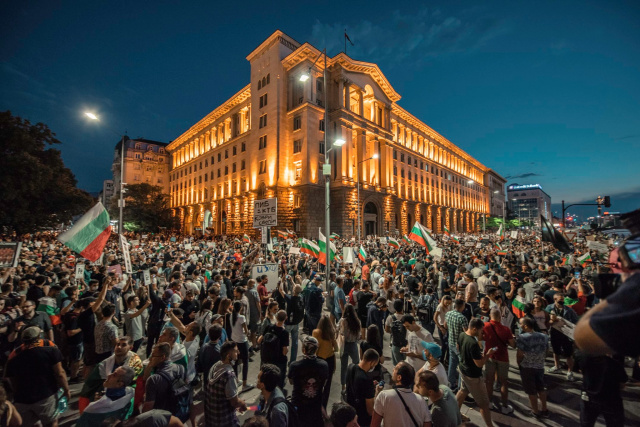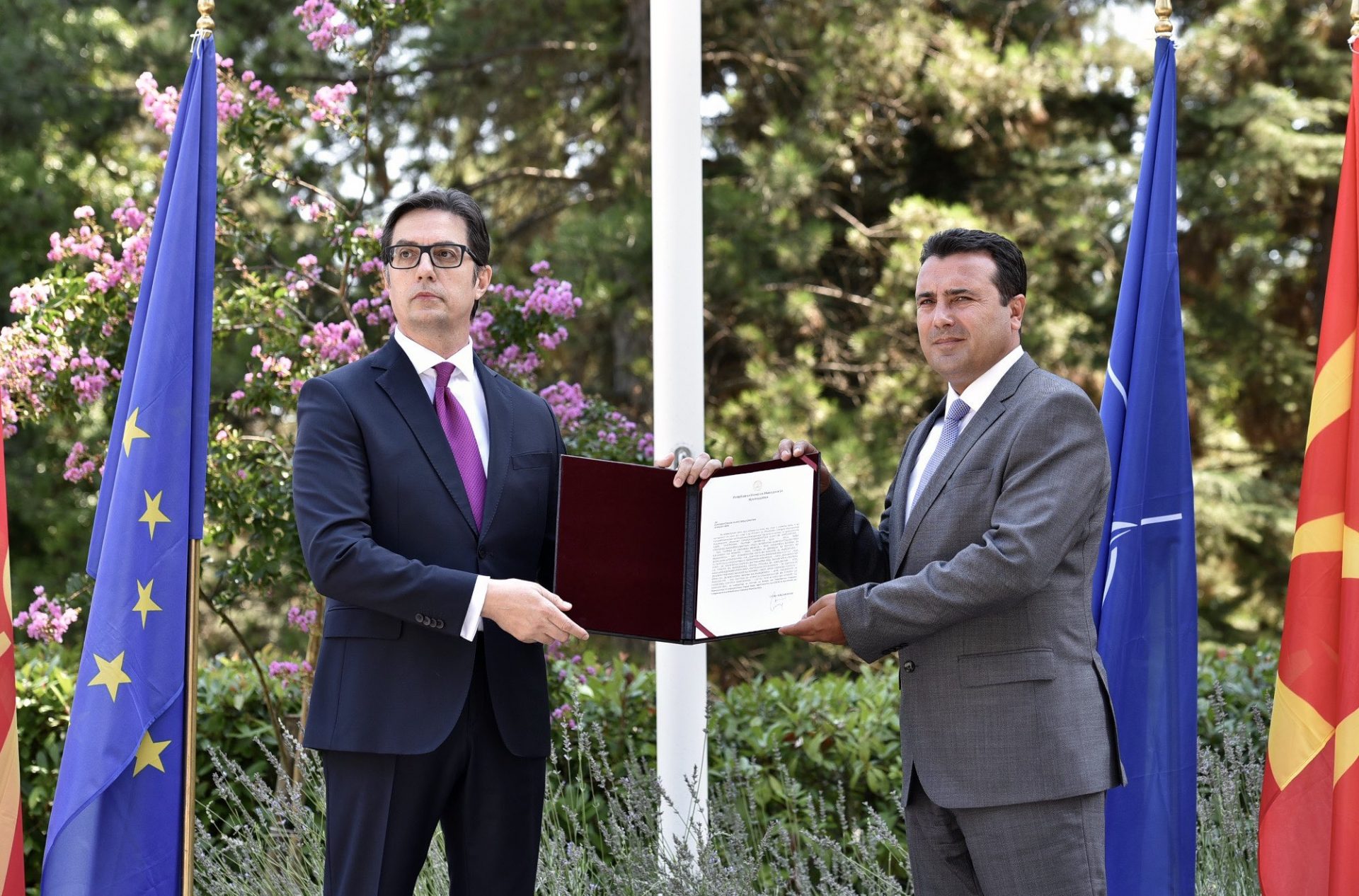
Bulgaria has recently become one of the targets of the ongoing Kremlin influence campaign, evidenced by pivots made by Russia’s propaganda war machine – “Russia Today” and “Sputnik International”.
Until recently, Sofia had been spared the ‘’benevolence’’ of Putin’s media spearheads, as Moscow had been concentrating its chief hybrid efforts on the main battlefronts – first Greece, then Brexit and finally the citadel of the West – the US and the presidential race. A quick comparison between RT’s and Sputnik’s coverage of events in Bulgaria during 2014, 2015 and 2016, and at present will suffice to reach a conclusion – Bulgaria has entered the final and decisive leg of the Kremlin’s hybrid operation. In the rare instances in the past when news from Sofia appeared on their newswire, the coverage was either intended to support specific Russian foreign policy moves or reflect internationally significant highlights in Bulgaria’s political calendar. Otherwise the work was routine — until Leonid Reshetnikov’s plan for subversion of Bulgaria’s geopolitical course came into play.
The current active phase of the propaganda coup started with a vintage hybrid news story launched via the association of independent social and market research agencies WIN/Gallup International. Its senior official and co-founder of the BBSS Agency manipulatively used the results of a survey conducted in 66 countries on the preferences of respective respondents. According to the pollsters – in four NATO member states (Greece, Slovenia, Turkey and Bulgaria) the majority of those polled preferred to turn to Russia for support in the event of an attack on their territory.
This wrapped-in-secrecy poll – no details were given on the methodology nor funding sources – contradicted previous polls and research done on the same issue. These have consistently measured the percentage of die-hard supporters of Russia – between 6-8 percent (i.e. the Bulgarian citizens that believe Russia’s interests come first by default) with another 20 percent believing that the Eurasian Union and Russia are a better bargain than the EU and NATO membership. Support for NATO, although slightly less than the corresponding figure for the EU, has remained high and above any analogous data for support for Russia. The BBSS’s manipulative interpretation stuck to the wording, “foreign power,” and not a security alliance – NATO has never been tested as a “country” counterweight to Russia. Individual NATO member states do not measure up to the added value of the whole alliance. Yet the headlines and the induced perception were crystal clear – Bulgarians still prefer Russia’s security guarantees.
The Kremlin’s mouthpieces – “Russia Today” and “Sputnik” – pointedly chose this alternative news to secure information milieu for the kick off of the “leave NATO” campaign. In a typical recycled propaganda classic, the Russian media strategists and their Bulgarian proxies used a Western based authority – WIN-Gallup international, borrowing heavily on the reputation of the US Gallup, sparing readers the key distinction between the two entities and the fact that the reputable US social and market research agency has four offices in Europe – the nearest being in Romania – and has no affiliation with the Bulgarian BBSS.
Building on the main theme – “Trump says NATO is irrelevant’’ – BBSS, in tandem with RT and Sputnik, generated the headline “Gallup survey – four NATO members chose Russia over NATO”. The message was simple – the time is ripe and Bulgarian politicians should stop shying away from using anti-NATO and anti-EU rhetoric in their electoral campaigns.
With all the ado about Bulgarian citizens’ “genetic” preordained affection for anything that emanates from the Kremlin, the hard facts are that over the last 20 years of transition, surveys and social research data consistently attest that most Bulgarians remain strongly affirmative on NATO membership. In spite of all the hype of Moscow’s sequence of hybrid war victories, Bulgarians are knowledgeable of the state of the security guarantees and the collective security system that Russia is part of.
Membership in the CSTO – which is the closest parallel to NATO – has not spared its members conflicts with Russia or their members. Three countries have left the CSTO – Azerbaijan, Georgia and Uzbekistan – while membership and security guarantees have not preempted the annexation of Crimea or the incursion in Eastern Ukraine. Russia has unsuccessfully attempted to use the CSTO to seek approval of its military moves in Crimea, South Ossetia and Abkhazia.
The “Gallup” labeled story introduced by BBSS doesn’t intend to trigger a spontaneous NATO exit process. The Kremlin is fully cognizant of two major constraints on that road – it can’t afford to take on board and foot the bill for new bulkier geopolitical cargoes in the defense and, to even greater degrees, the financial and economic fields.
Right now, Russia has more on its plate that it can chew.
The talk of a possible Bulexit from NATO is sheer speculation aimed at destroying its credibility and already frail image as a wavering NATO ally and a Russian Trojan horse. The Kremlin’s latest strategy is focused on the erosion of the EU and NATO from within and by probing new areas of exploitable vulnerabilities, following the containment of the refugee crisis and the gradual absorption of the Brexit and Trump shock effects. One of Moscow’s greatest hopes is to use the Balkans, Europe’s soft underbelly, to generate devastating seismic waves.
Moscow suffered a humiliating defeat in Montenegro following its entry into NATO and the flop of the coup attempt. Its strategists realized, after Serbia drew the red line for Russia’s secret operations into neighboring countries, that without Bulgaria, the Kremlin’s Balkans strategy will be doomed. Igniting existential conflicts and old feuds in the Western Balkans against a background of EU and NATO relative disengagement from the region, in Moscow’s mindset, offers a chance to shock and shatter already distressed Europe. Bulgaria is an indispensable strategic asset for its blend of membership in NATO and the EU and the growing dependence of parts of its ruling elite on keeping open lines of communication with the Kremlin.
Russian strategists believe that the anti-EU and anti-NATO verbiage used in the current Bulgarian election campaign could rekindle the debate in Western European and US societies on the merits of a one-speed EU and NATO and open new opportunities for geostrategic reshuffles in the region. There is a direct link between the growing sentiments in the West for changing course to a multi-speed Europe and the growing suspicion in the West that ruling elites in Bulgaria, Hungary and some other CEE states are trying to strike separatist deals with Russia. Concerns are growing in EU and NATO circles that these countries are not at all interested and capable of parting with decades’ long bonds with Moscow.
Amplifying mutual suspicion between the ‘laggards’ and the leaders in the EU and NATO is the alter ego of the Kremlin’s divide and rule foreign policy.
The purposeful delusion that Bulgaria and the countries in the region could become security self-sufficient could be outshined only by the equally suicidal talk about a possible exit from NATO and the EU – either tacit or overt. Unlike other member states of NATO and the EU, Bulgaria has relatively short history of independence and long experience of subdued, foreign dominated existence. The more than 45 years of Soviet dominance and the cleansing of elite following the Second World War have negatively impacted its integration capacity and its drive to accede and return to the core values of the European civilization.
The accession to NATO and the EU has been mostly a politically driven process as the country could hardly comply with all the membership criteria, some intentionally kept murky. In more than one way, this was trust given in advance that seemed to rely on the country elite’s ability to break away with past dependencies and embark on a pursuit of EU-harmonized national centric goals.
NATO exit headlines in the media would inevitably lead to a surge in key allies’ suspicion on where Bulgaria stands in the EU/NATO and Russia exchange. This in turn could easily replicate in a downward self-accelerating spiral and a cascade of national failures.
No surprise that the anti-West rhetoric is richly garnished with nationalistic fervor and appeals to ‘stand tall’ to Brussels and reclaim power back to Sofia.
This is not a Bulgaria specific phenomenon.
However, few politicians realize that verbal abuse with NATO and EU membership comes at a price. Even fewer understand how far-reaching and deep is the interdependence of the welfare and security dimensions of Bulgaria’s development and NATO membership.
Income levels, individual rights and freedoms (including freedom to travel, to seek residence and work abroad, etc.), access to global capital markets, cost of credit, default risk premiums, budgets, spending, inflation rates, debt and corruption level. etc. are all EU and NATO sensitive.
The list of direct and collateral damage should the EU and NATO write off Bulgaria as a trustworthy partner is long, but that would not mean the end of the world. Bulgaria could continue to toddle along some ‘middle’ path – the option revered by pro-Russian circles for their personal and collective wellbeing, where new Grand Slam projects happen (Hungary already confirmed that South Stream will be renewed after the elections in Bulgaria) and the country could even continue to buy Russian weapons or declare neutrality. For this is the other side of the coin – Russia is no threat to Bulgaria. This will mean a rerun of Kosovo crisis themes in Bulgarian-Russian relations– when Russian PM Primakov offered Sofia the choice of neutrality over NATO membership.
All these steps could hardly constitute a strategy or a plan on the part of the Kremlin or its local political proxies that was duly preceded by a proper impact and risk-reward assessment. Moscow does not need one – it is not interested in anything long-term. All it wants is to exert its negative power seeking tactical gains while attempting to bargain hard with West for zones of influence and geopolitical tradeoffs.
If one asks the leaders of the key political parties that are likely to be represented in the next parliament in Sofia on the chances for a NATO and EU Bulexit, they would deny the possibility outright. In private exchanges, some of them might even confer that they are trying to appease the Russians and are just flirting with an idea close to Kremlin’s heart, although they do not have the slightest intention to leave or initiate a process of departure from both organizations.
However, no one is ready to take serious steps to reform the institutions, to adopt European policy standards in public governance and tackle the corruption problem – the glue that bonds together the Russian and Bulgarian political models.
It is in Bulgaria’s vital interest to detach itself from the final journey of Putin’s Russia into its irredeemable crisis.










